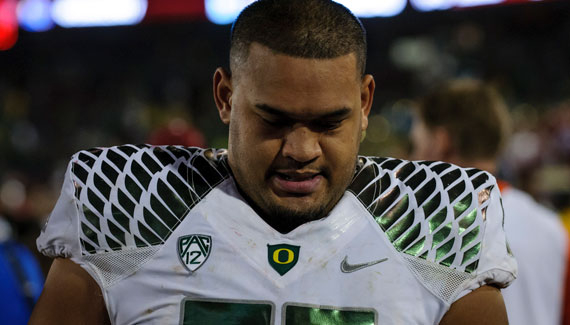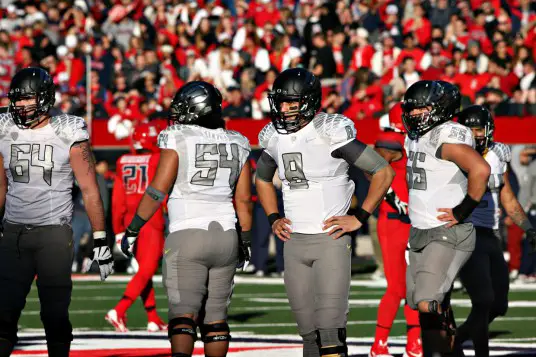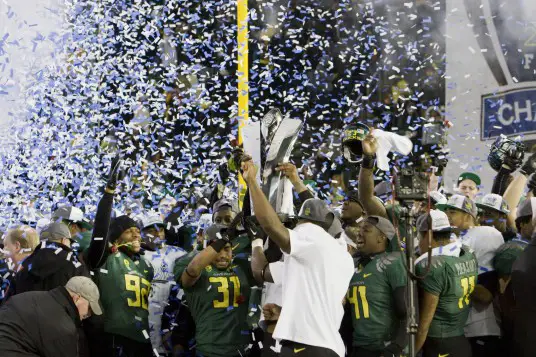Craig Strobeck
One of the complaints of the modern shift in college football, with conference realignment and the addition of a playoff amongst other changes, is the end of annual matchups in many historical rivalries. Yet it is Oregon’s biggest rival in recent years, the BCS, that the Ducks will happily say goodbye to as this era ends. After four years of success in the rivalry, the BCS fired a parting shot on its way out the door.
The Pac-12 and SEC were nation’s two most competitive conferences this season. On Sunday, they shared a distinction, the only two conferences in the country with a top ten team that was left out of the BCS. But while these SEC’s schools (Missouri & South Carolina) were left out because the conference had reached its cap on teams that could be selected, the Pac-12, the most competitive conference in the nation this year, failed to put two teams in the BCS for the first time since 2009.
Why? While I can offer my thoughts, Sports Illustrated‘s Andy Staples explained what happened with the Sugar Bowl far more succinctly in 140 characters than I ever could:
Please allow me to answer all your bowl questions in one shot: Because of money.
— Andy Staples (@Andy_Staples) December 8, 2013
It is understandable that everyone wants to get on their ragey high-horse, but before we do that, it is important to remember that Oregon didn’t get screwed by being left out of the BCS. Chosen over? Sure. A victim of the process? No doubt. But this wasn’t a team that had any business complaining about where they landed. In fact, this wouldn’t even qualify as a top-three BCS game screwjob against the Ducks in the last fifteen years. That list being:
3) 2001 Rose Bowl
Despite beating eventual Rose Bowl representative Washington head-to-head and having identical 7-1 conference records, Oregon is the first team eliminated in the three-way tiebreaker between Washington, Oregon State and Oregon, based on its week two loss to Wisconsin, a game that should have had no bearing on the Pac-10 race whatsoever. (Is it any wonder why programs are historically gun-shy about scheduling difficult games?)
2) 2006 Fiesta Bowl
10-1 Oregon, whose sole loss was to No. 1 USC, is left out of the BCS, while two-loss Notre Dame, because they were Notre Dame, was selected as the final at-large spot. The Irish would go on to lose to their eighth consecutive bowl game, falling 34-20 to Ohio State.
1) 2002 BCS Championship Game
This is where we remind everyone of a by-gone time where computers played such heavy role in determining the national championship participants that the system decided that the 10-1 Ducks should be ranked below a two-loss Colorado team and a Nebraska team that didn’t even win its own conference. Both of those teams lost as Oregon finished the season ranked second in the nation.
Oregon’s second loss ushered its exodus out of the BCS lineup; not specifically because of its record, but because that loss put their fate in subjective hands. When Ohio State’s loss took away the possible Orange Bowl spot that Oregon had politicked for all week, only the Sugar Bowl remained, a game with a poor recent history of choosing its participants based on bad intelligence gathering.
In 2011, the Sugar Bowl controversially picked Virginia Tech over highly-ranked teams Kansas State and Boise State for an at-large bid. The Sugar Bowl used the argument that it chose Virginia Tech because of the Hokies reputation for travelling, only to be served the kind of karmic justice deserved of those who make decisions purely on greed when Virginia Tech only sold half of its initial allotment of tickets, while Kansas State’s pre-sale of tickets prior to season’s end exceeded Virginia Tech’s purchases.
Because the BCS uses computers and formulas to create the rankings, there is a false assumption amongst the public that there is any logic to the way decisions are made with regards to bowl games that decides matchups by quality rather than quantity ($). While the title game pairing may be determined that way, when left to their own devices, the individual bowls are still going to choose their participants based on the most fallible of criteria: the antiquated knowledge of the executives running the game. They used the “ticket sales” assumption with Virginia Tech, and they used it again yesterday with Oklahoma.
To them, Oregon is the same as Kansas State or even Boise State. It is important to point out that the Sugar Bowl has never selected a team from the Pac-12 (Utah is the only current conference member to have ever played in the game, when they were forced upon the Sugar Bowl while a member of the Mountain West), and wasn’t going to make its first ever selection of a Pac-12 team over a little thing like ratings. Besides, they already sold those games to ESPN, what do they care about ratings?
The main reason for the Sugar Bowl’s decision is they have a relationship with the Big 12 beginning next season, and as covered above, it’s all about protecting the relationships. And while unfortunate as this may be, this is the ugly game Oregon became entangled in following its loss to Arizona.
So what can be done? First off, the Pac-12 has to start arranging better bowl matchups. Not only did Oregon get left out of a BCS bowl because of politics, but there was a lot of work that went into securing spots for all the conference’s bowl-eligible teams. This is a conference that has insisted in recent years that it is the most formidable challenger to the SEC for the best conference in college football. Yet, while the SEC has no problem finding a place for its teams in the postseason, the Pac-12 needs to work to make sure its teams aren’t sweating out the final Sunday waiting to see if they will play in a bowl game. Last but not least, would it kill the Pac-12 and the SEC to set up just one bowl game against each other?
Meanwhile, coaches always say that winning a bowl game is the best way to end a season. In that regard, playing a mediocre Texas team rather than an Alabama buzzsaw that was the best team in the nation for its first 11 games could be the best thing for this team heading into 2014. Beat Texas, a team that beat Oklahoma, the school that was picked over Oregon, and prove the Sugar Bowl wrong.
Duck fans may be disappointed that the BCS bowl streak has ended, but the BCS streaks are ending for everyone after this season, and not a moment too soon. While the era itself was good to Oregon, the process was not, leaving the Ducks outside looking in on a BCS contest it had a case for four times in the 16 years of the system.
As the program that elevated itself the most during the BCS era, it really should make Oregon its best representation, as well. That, no matter how much success a team tries to carve out for itself, the antiquated ugliness of the college football’s postseason structure still throws its weight around. They chose bowl matchups like this, and then wonder why fans clamor for a playoff.
Big game matchups should be decided by the best teams, not the best relationships. They are modern-day despots, denying people what they want for the interest of their pockets. The sooner that ugliness can end, the better.
Related Articles:
Chip Kelly Update: Everything's Good Again ...
Chip Kelly Update: Wailing and Gnashing of Teeth
Shock and Awe -- The Oregon Ducks' Football Hangover Effect
Despite Lopsided Score, Georgia State "Never Stopped Believing"
Hope Springs Eternal for Ducks
Incompetent Pac-12 Officials: How Do You Miss ALL of THIS?
Nathan Roholt is a senior writer and managing editor emeritus for FishDuck. Follow him on Twitter @nathanroholt. Send questions/feedback/hatemail to nroholtfd@gmail.com.




